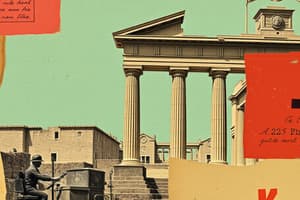Podcast
Questions and Answers
What does the name Augustus mean?
What does the name Augustus mean?
- The Revered One (correct)
- The Great Leader
- The Emperor
- The Protector
What is another word for 'emperor'?
What is another word for 'emperor'?
Imperator
Who guards the emperor?
Who guards the emperor?
Praetorian Guard
Who appointed the governors?
Who appointed the governors?
Who were the deputies that governed provinces given to the emperor?
Who were the deputies that governed provinces given to the emperor?
What general led the legions that were massacred by a coalition of German tribes?
What general led the legions that were massacred by a coalition of German tribes?
How many years did Augustus dominate the Roman world?
How many years did Augustus dominate the Roman world?
What did Augustus do regarding senatorial governors?
What did Augustus do regarding senatorial governors?
Who was the Roman historian that commented on the state of the government?
Who was the Roman historian that commented on the state of the government?
Who was Augustus' stepson and successor?
Who was Augustus' stepson and successor?
What was the next dynasty after Augustus known as?
What was the next dynasty after Augustus known as?
What replaced most of the Senate's responsibilities?
What replaced most of the Senate's responsibilities?
What was the name of the emperor who faced revolts and then committed suicide?
What was the name of the emperor who faced revolts and then committed suicide?
What does 'Pax Romana' refer to?
What does 'Pax Romana' refer to?
Who are known as the 5 Good Emperors?
Who are known as the 5 Good Emperors?
What program did Trajan implement to assist poor parents?
What program did Trajan implement to assist poor parents?
Who withdrew forces from Mesopotamia but retained Dacia and Arabia?
Who withdrew forces from Mesopotamia but retained Dacia and Arabia?
What is Latin known for in the western part of the Roman Empire?
What is Latin known for in the western part of the Roman Empire?
What role did local city officials play in the Roman Empire?
What role did local city officials play in the Roman Empire?
What were the chief Italian ports for merchants from all over the empire?
What were the chief Italian ports for merchants from all over the empire?
What contributed to unprecedented levels of trade in the Roman Empire?
What contributed to unprecedented levels of trade in the Roman Empire?
What was the chief pursuit of most people in the Roman Empire?
What was the chief pursuit of most people in the Roman Empire?
Flashcards are hidden until you start studying
Study Notes
Key Figures and Terms
- Augustus: Name adopted by Octavian, meaning "the revered one," marking the beginning of the Roman Empire.
- Imperator: Title for an emperor or commander-in-chief, symbolizing command over military forces.
- Praetorian Guard: Elite unit tasked with protecting the emperor, crucial for maintaining imperial security.
- Governors: Officials appointed by the Senate to oversee provinces, facilitating local administration.
- Legates: Deputies acting on behalf of the emperor to manage provinces, ensuring loyalty and efficiency.
Historical Events and Policies
- Varus' Defeat: A crucial military disaster where General Varus lost three legions to German tribes, impacting Roman expansion efforts.
- Augustus' Dominance: Oversaw the Roman world for 45 years, transforming the political landscape.
- Imperial Policy: Augustus effectively bypassed senatorial authority by instituting direct control over governance.
Historical Perspectives
- Tacitus: Noted historian who remarked on the decline of Republican governance in Rome, emphasizing the shift towards imperial commands.
- Pax Romana: Era of "Roman Peace" characterized by stability and prosperity throughout the empire lasting approximately 200 years.
Dynasties and Governance
- Julio-Claudian Dynasty: Successors of Augustus, all connected to his family or that of his wife, Livia.
- Imperial Bureaucracy: Transition of senatorial responsibilities to emperors and appointed freemen, allowing for more efficient governance.
- Five Good Emperors: Notable rulers recognized for their effective administration, respect for the ruling class, and positive domestic policies.
Infrastructure and Societal Development
- Trajan's Alimentary Program: Initiative providing financial assistance for impoverished families to ensure children's education.
- Extensive Building Programs: Trajan and Hadrian's focus on public works that enhanced urban infrastructure.
- Urban Centers: Cities like Rome and Alexandria served as cultural and administrative hubs, vital for spreading Roman ideals.
Economic Aspects
- Trade Routes: Established connections between Han China and Rome, facilitating cultural and economic exchange.
- Silk Road: Key trade network linking the East and West, integral for commerce during the empire's peak.
- Agricultural Base: Agriculture formed the backbone of the Roman economy, with areas like Etruria and the Po Valley thriving.
Cultural Integration
- Greco-Roman Civilization: Cultural fusion of Roman and Greek elements, influencing art, architecture, and governance.
- Language: Latin was predominantly used in the western part of the empire, while Greek was prevalent in the eastern regions.
Societal Structure
- Local City Officials: Acted as intermediaries between the central government and local populations, crucial for executing policies.
- Free Tenant Farmers: Provided essential agricultural labor while paying rent in various forms, supporting local economies.
Challenges and Decline
- Nero's Rule: His infamous actions led to revolts among the legions, culminating in his suicide, reflecting internal strife.
- Overextension of Empire: Expansion into Dacia and other regions strained resources, prompting a return to Augustus’ defensive strategy.
- Caligula's Leadership: Known for instability and cruelty, symbolizing the potential for chaos within the imperial system.
Studying That Suits You
Use AI to generate personalized quizzes and flashcards to suit your learning preferences.




